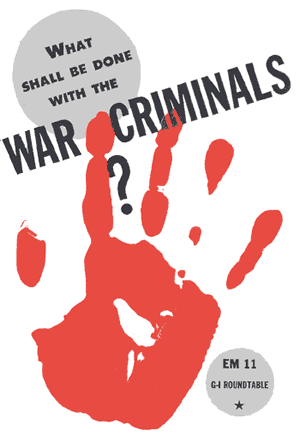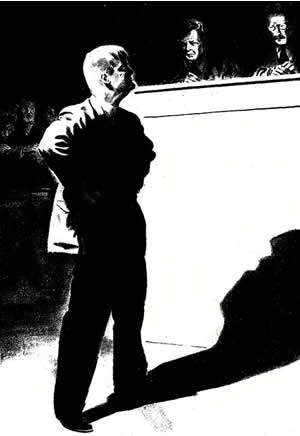By Sheldon Glueck
Professor of Criminal Law and Criminology, Harvard University
(Published August 1944)
 Table of Contents
Table of Contents
The Rules of Warfare and Their Violation
What Happened after the Last War?
Under What Laws Shall the United Nations Proceed?
Trial by International Tribunals
Are “Superior Orders” a Legitimate Defense?
How Shall the Guilty Be Punished?
Suggestions for Further Reading
Introduction
 The vigorous Moscow Statement by President Roosevelt, Prime Minister Churchill, and Premier Stalin on atrocities has been widely discussed and debated. Few people question the right of the United Nations to bring the war criminals to trial and to punish them. But many problems will arise when this difficult job is begun.
The vigorous Moscow Statement by President Roosevelt, Prime Minister Churchill, and Premier Stalin on atrocities has been widely discussed and debated. Few people question the right of the United Nations to bring the war criminals to trial and to punish them. But many problems will arise when this difficult job is begun.
What is a war crime and who are the war criminals? In what courts shall the accused be tried? By what laws? What punishments shall be meted out to them?
To each of these and related questions there are many possible answers. And, if we may judge by the experience of the first World War, there may not be entire agreement among the people of the United Nations. The following discussion, therefore, is an attempt to explore but not prejudge the problems that will come up in trying to deal with the war criminals and in bringing them to the bar of justice.
Let us assume that the armies of the United Nations, having crushed enemy resistance, have marched into Germany, Japan, and other Axis countries. They have taken into custody all the enemy leaders, both political and military, on whom they can lay their hands. These may include Hitler, Goering, Goebbels, Tojo, Mussolini, the general staffs of the German and Japanese armies together with the naval leaders, and the Gestapo chiefs. The catch will include the local quislings and others who have committed, or ordered committed, the inhuman crimes we have all read about. What shall be done with them? How shall we do justice and yet not make martyrs of them?
Many people have a ready answer—“Shoot ’em or string ’em up!” But this kind of action is not consistent with our aims, nor with those of our Allies. It is true that a victorious power can impose upon a defeated power such terms as it wants to, restrained only by its concern for the judgment of history and its regard for the principles of international law. Looked at in this way, the problem of what to do with Axis war criminals is essentially a problem of policy and expediency rather than of legal technicality. But the United Nations are determined to restore law and order and a civilized way of life to lands now under Axis tyranny. By shooting or hanging even the most notorious of war criminals without legal trial, we and our Allies would be charged with sinking to the barbaric level of our enemies.
In civilized countries even a killer caught with a smoking gun in his hand is entitled to a fair trial. The laws and customs to which all civilized states adhere require that man who commits a crime be tried in an orderly legal way and given an opportunity to defend himself.
From a Statement by President Roosevelt, Prime Minister Churchill, and Premier Stalin Issued at Moscow, November 1, 1943
The United Kingdom, the United States and the Soviet Union have received from many quarters evidence of atrocities, massacres and cold blooded mass executions which are being perpetrated by Hitlerite forces in many of the countries they have overrun and from which they are now being steadily expelled. …
Accordingly, the aforesaid three Allied Powers, speaking in the interests of the thirty-three United Nations, hereby solemnly declare and give full warning of their declaration as follows: At the time of granting of any armistice to any government which may be set up in Germany, these German officers and men and members of the Nazi Party who have been responsible for or have taken a consenting part in the above atrocities, massacres and executions will be sent back to the countries in which their abominable deeds were done in order that they may be judged and punished according to the laws of these liberated countries and of the free governments which will be erected therein. Lists will be compiled in all possible detail from all these countries, having regard especially to invaded parts of the Soviet Union, to Poland and Czechoslovakia, to Yugoslavia and Greece including Crete and other islands, to Norway, Denmark, Netherlands, Belgium, Luxembourg, France and Italy.
Thus, Germans who take part in wholesale shooting of Polish officers or in the execution of French, Dutch, Belgian or Norwegian hostages or of Cretan peasants, or who have shared in slaughters inflicted on the people of Poland or in territories of the Soviet Union which are now being swept clear of the enemy, will know they will be brought back to the scene of their crimes and judged on the spot by the peoples whom they have outraged. Let those who have hitherto not imbrued their hands with innocent blood beware lest they join the ranks of the guilty, for most assuredly the three Allied Powers will pursue them to the uttermost ends of the earth and will deliver them to their accusers in order that justice may be done.
The above declaration is without prejudice to the case of German criminals, whose offenses have no particular geographical localization and who will be punished by joint decision of the Governments of the Allies.
Related Resources

September 7, 2024
Travel and Trade in Later Medieval Africa

September 6, 2024
Sacred Cloth: Silk in Medieval Western Europe

September 5, 2024